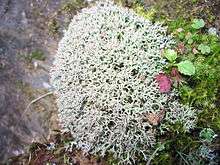Cladonia stellaris
Cladonia stellaris is an ecologically important species of lichen that forms continuous mats over large areas of the ground in boreal and arctic regions around the circumpolar north. The species is a preferred food source of reindeer and caribou during the winter months,[1][2][3] and it has an important role in regulating nutrient cycling and soil microbiological communities.[4] Like many other lichens, Cladonia stellaris is used by humans directly for its chemical properties, as many of the secondary metabolites are antimicrobial (e.g., Usnic acid), but it also has the unique distinction of being harvested and sold as 'fake trees' for model train displays.[5] It is also used as a sound absorber in interior design.[6]
| Cladonia stellaris | |
|---|---|
 | |
| Cladonia stellaris | |
| Scientific classification | |
| Kingdom: | |
| Division: | |
| Class: | |
| Order: | |
| Family: | |
| Genus: | |
| Species: | C. stellaris |
| Binomial name | |
| Cladonia stellaris (Opiz) Pouzar & Vězda (1971) | |
| Synonyms | |
|
Cenomyce stellaris Opiz (1823)
| |
Cladonia stellaris is described as mat-forming and fruticose (shrub-like) in appearance, and as terrestrial, terricolous, or epigeic, because it grows on the surface of bare soil or gravel. Like most other lichens, Cladonia stellaris grows slowly, averaging less than 0.5 cm per year under good conditions.[7]
This species differs from the similar Cladonia rangiferina and Cladonia arbuscula in that it forms much more distinct cushion-shaped patches, and appears to have denser branching when viewed from above.[8]
See also
References
- Pegau, R (1969). "Effect of reindeer trampling and grazing on lichens". Journal of Range Management. 23 (2): 95–97. doi:10.2307/3896107. JSTOR 3896107.
- Thomas & Hervieux (1986). "The late winter diets of barren-ground caribou in North-Central Canada". Rangifer. 1 (2): 305–310. doi:10.7557/2.6.2.663.
- Cichowski, D.B. (1989). Seasonal movements, habitat use, and winter feeding ecology of woodland caribou in west-central British Columbia. MSc. thesis. Univ. B.C., Vancouver, B.C. 143 p.
- Stark, Sari; Wardle, David A.; Ohtonen, Rauni; Helle, Timo; Yeates, Gregor W. (2000). "The effect of reindeer grazing on decomposition, mineralization and soil biota in a dry oligotrophic Scots pine forest". Oikos. 90 (2): 301–310. doi:10.1034/j.1600-0706.2000.900210.x. JSTOR 3547140.
- Purvis, O.W. (2000). Lichens. Natural History Museum, London, U.K.
- http://nordgrona.com/
- Thomson, J.W. (1967). The lichen genus Cladonia in North America. University of Toronto Press, Toronto, Canada.
- Brodo, I. M., S. D. Sharnoff, and S. Sharnoff (2001). Lichens of North America. Yale University Press, New Haven, CT, U.S.A.
| Wikimedia Commons has media related to Cladonia stellaris. |
| Wikispecies has information related to Cladonia stellaris |